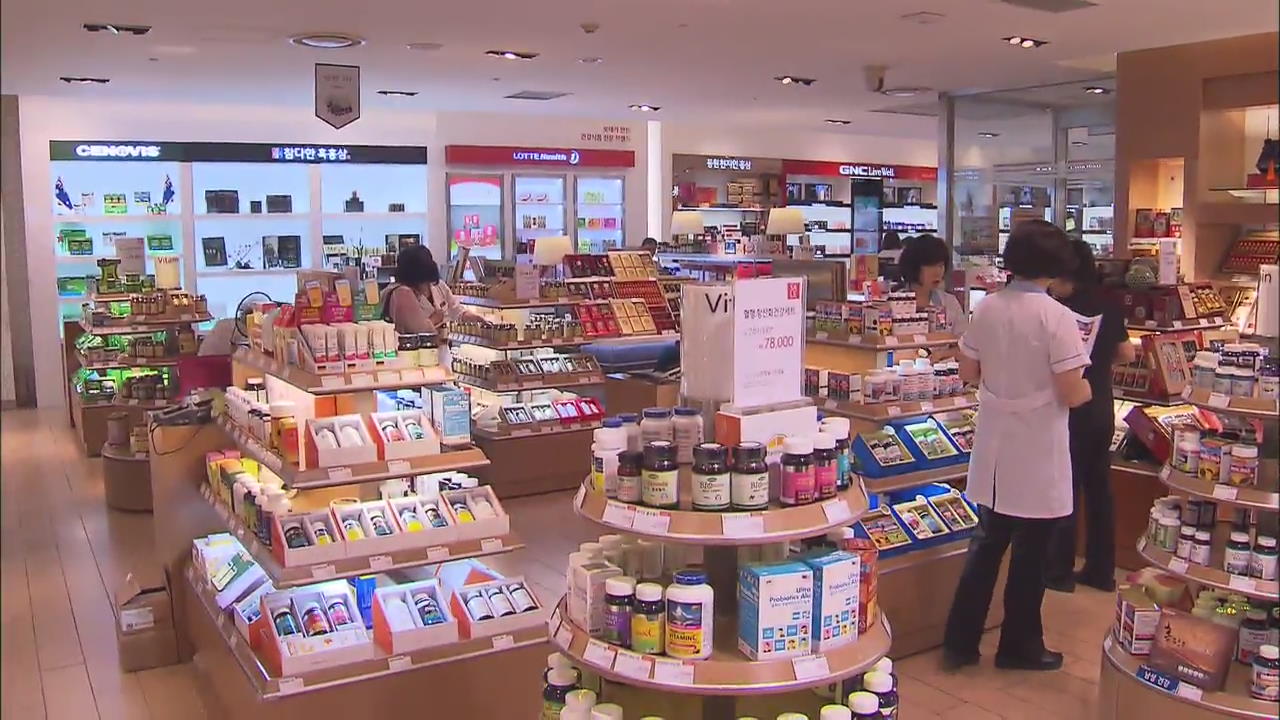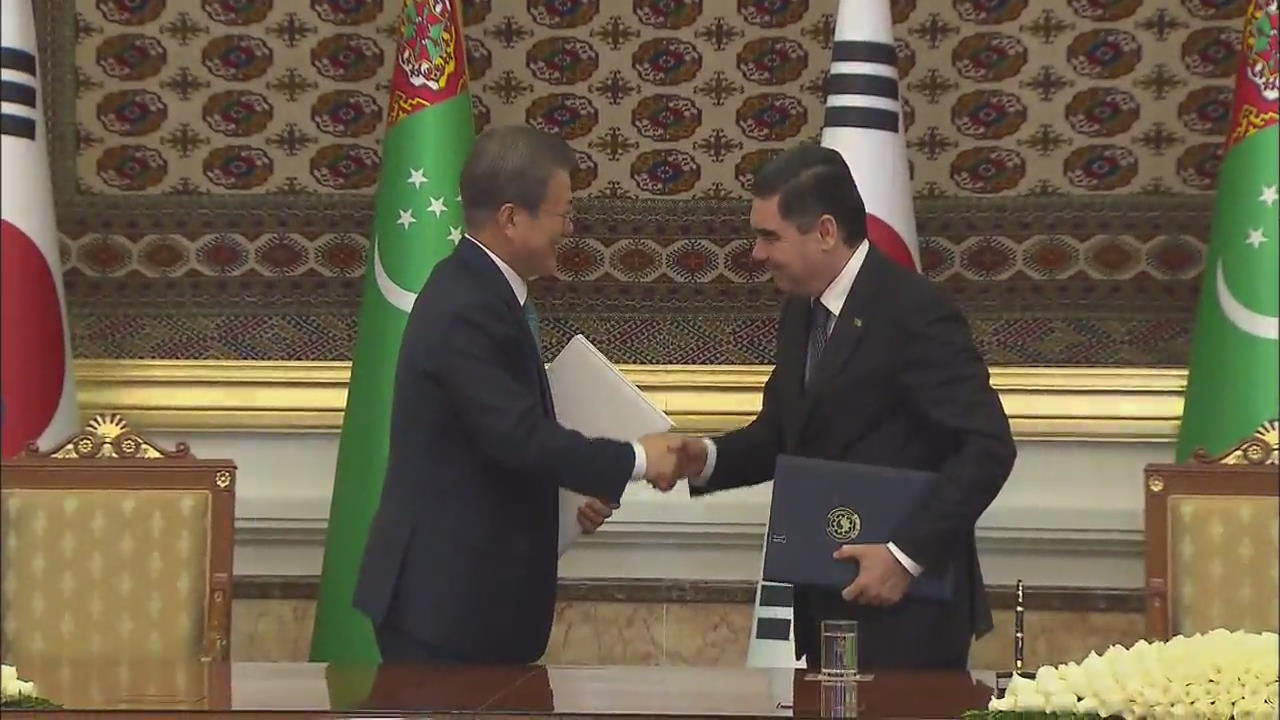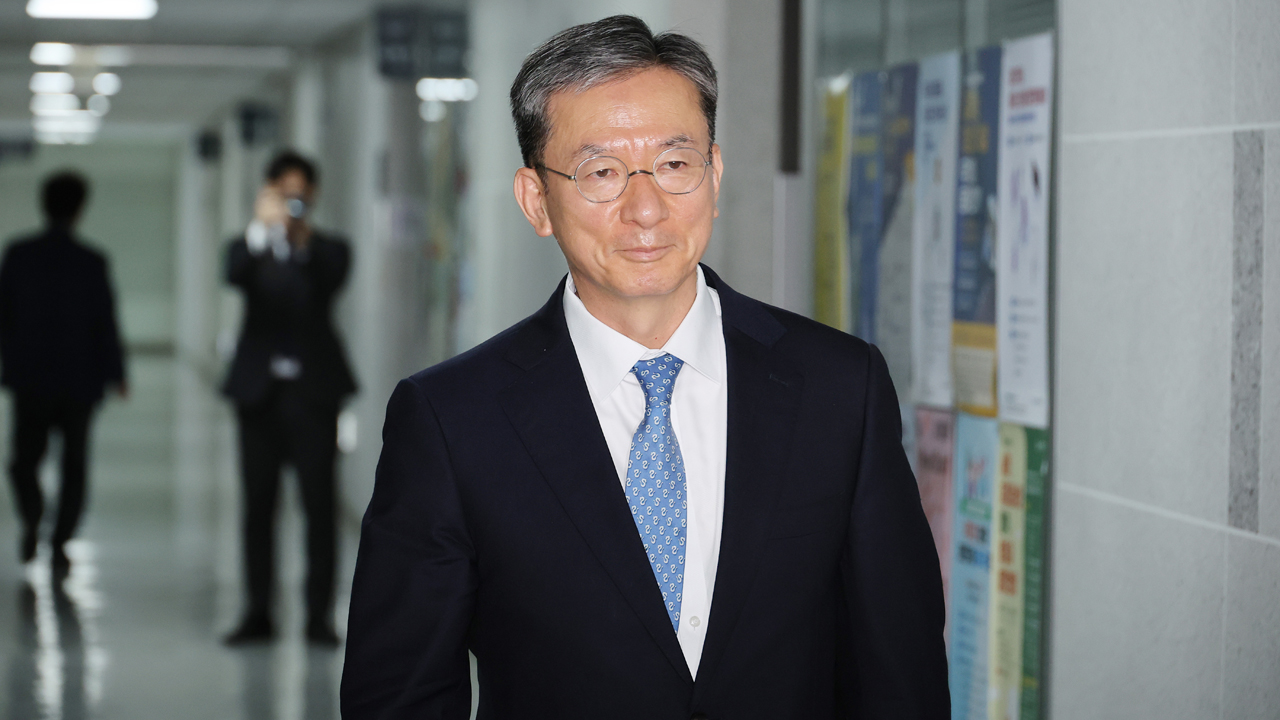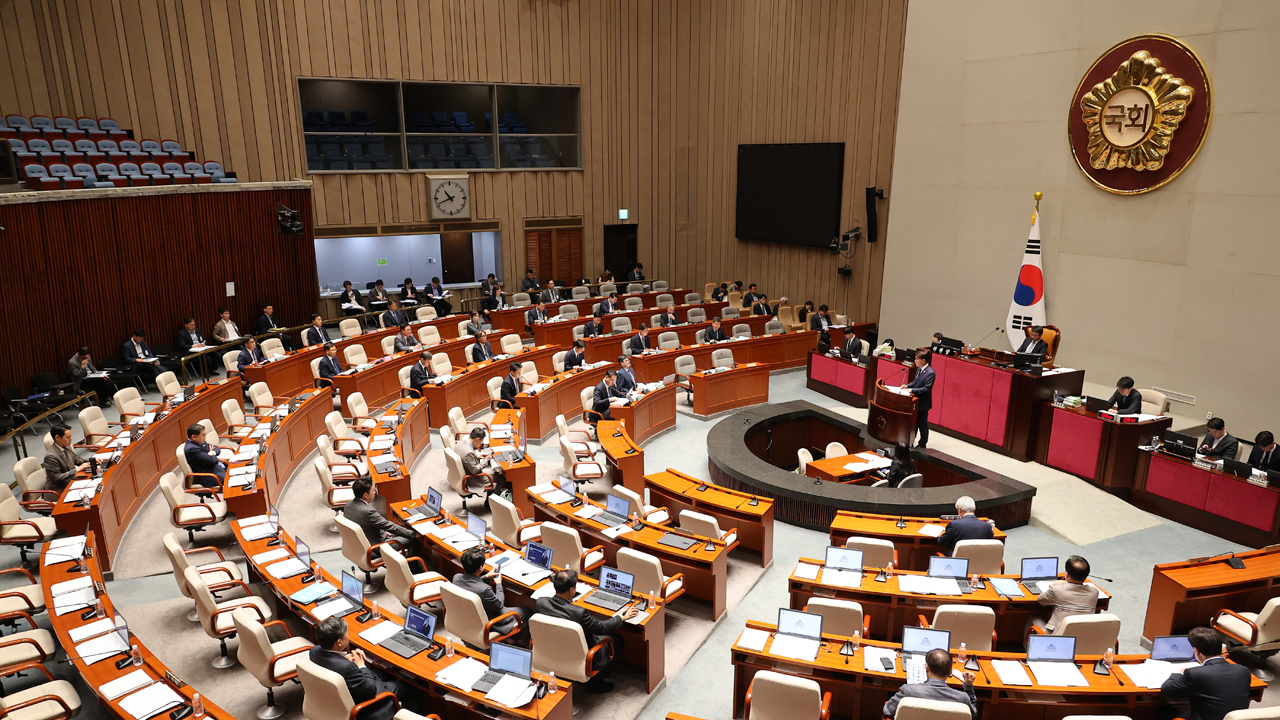NUTRITIONAL SUPPLEMENTS
입력 2019.04.18 (15:23)
수정 2019.04.18 (15:41)
읽어주기 기능은 크롬기반의
브라우저에서만 사용하실 수 있습니다.
[Anchor Lead]
As interest in health and well-being keeps rising in Korea, demand for nutritional supplements is also surging. The Korean government has decided to allow the sale of nutritional supplements at supermarket chains and department stores.
[Pkg]
More than half of nutritional supplement sales used to come from door-to-door sales. But from now on more nutritional supplements will likely be sold at department stores and supermarket chains. The government has decided to scrap the regulation demanding that department stores and supermarkets report to authorities before selling health supplement products to consumers.
[Soundbite] KWON SEOK-HYUNG(KOREA HEALTH SUPPLEMENTS ASSOCIATION) : "We expect the market to grow evenly on more vigorous offline sales."
Regulations on the ingredients of nutritional supplements and their management, which are currently similar to the regulations on pharmaceutical products, will also be eased. The global nutritional supplement market reaches 150 trillion won. However, Korea only holds a one-percent share.
[Soundbite] HONG NAM-KI(DEPUTY PM FOR ECONOMY) : "We will permit that scientifically proven food is also labeled as ‘functional’ and will set clear standards on new functional ingredients."
The government has also decided to abolish 31 regulations on new industries such as fire extinguishing items using the Internet-of-Things. But despite the efforts to ease the relevant regulations, there is still a long way to go. One out of four regulations subject to overhaul has been either postponed or suspended. As such, Korea ranked 79th among 140 countries in terms of burden posed on businesses by government regulations.
[Soundbite] JOO WON(HYUNDAI ECONOMIC RESEARCH INST.) : "There are only a few dozen regulations that have been overhauled. It is insufficient for the public and businesses to feel the effect."
Last year, 88 regulations were lifted in Korea, but more than 1,100 new ones were enacted every year on average over the past nine years.
As interest in health and well-being keeps rising in Korea, demand for nutritional supplements is also surging. The Korean government has decided to allow the sale of nutritional supplements at supermarket chains and department stores.
[Pkg]
More than half of nutritional supplement sales used to come from door-to-door sales. But from now on more nutritional supplements will likely be sold at department stores and supermarket chains. The government has decided to scrap the regulation demanding that department stores and supermarkets report to authorities before selling health supplement products to consumers.
[Soundbite] KWON SEOK-HYUNG(KOREA HEALTH SUPPLEMENTS ASSOCIATION) : "We expect the market to grow evenly on more vigorous offline sales."
Regulations on the ingredients of nutritional supplements and their management, which are currently similar to the regulations on pharmaceutical products, will also be eased. The global nutritional supplement market reaches 150 trillion won. However, Korea only holds a one-percent share.
[Soundbite] HONG NAM-KI(DEPUTY PM FOR ECONOMY) : "We will permit that scientifically proven food is also labeled as ‘functional’ and will set clear standards on new functional ingredients."
The government has also decided to abolish 31 regulations on new industries such as fire extinguishing items using the Internet-of-Things. But despite the efforts to ease the relevant regulations, there is still a long way to go. One out of four regulations subject to overhaul has been either postponed or suspended. As such, Korea ranked 79th among 140 countries in terms of burden posed on businesses by government regulations.
[Soundbite] JOO WON(HYUNDAI ECONOMIC RESEARCH INST.) : "There are only a few dozen regulations that have been overhauled. It is insufficient for the public and businesses to feel the effect."
Last year, 88 regulations were lifted in Korea, but more than 1,100 new ones were enacted every year on average over the past nine years.
■ 제보하기
▷ 카카오톡 : 'KBS제보' 검색, 채널 추가
▷ 전화 : 02-781-1234, 4444
▷ 이메일 : kbs1234@kbs.co.kr
▷ 유튜브, 네이버, 카카오에서도 KBS뉴스를 구독해주세요!
- NUTRITIONAL SUPPLEMENTS
-
- 입력 2019-04-18 15:25:30
- 수정2019-04-18 15:41:13

[Anchor Lead]
As interest in health and well-being keeps rising in Korea, demand for nutritional supplements is also surging. The Korean government has decided to allow the sale of nutritional supplements at supermarket chains and department stores.
[Pkg]
More than half of nutritional supplement sales used to come from door-to-door sales. But from now on more nutritional supplements will likely be sold at department stores and supermarket chains. The government has decided to scrap the regulation demanding that department stores and supermarkets report to authorities before selling health supplement products to consumers.
[Soundbite] KWON SEOK-HYUNG(KOREA HEALTH SUPPLEMENTS ASSOCIATION) : "We expect the market to grow evenly on more vigorous offline sales."
Regulations on the ingredients of nutritional supplements and their management, which are currently similar to the regulations on pharmaceutical products, will also be eased. The global nutritional supplement market reaches 150 trillion won. However, Korea only holds a one-percent share.
[Soundbite] HONG NAM-KI(DEPUTY PM FOR ECONOMY) : "We will permit that scientifically proven food is also labeled as ‘functional’ and will set clear standards on new functional ingredients."
The government has also decided to abolish 31 regulations on new industries such as fire extinguishing items using the Internet-of-Things. But despite the efforts to ease the relevant regulations, there is still a long way to go. One out of four regulations subject to overhaul has been either postponed or suspended. As such, Korea ranked 79th among 140 countries in terms of burden posed on businesses by government regulations.
[Soundbite] JOO WON(HYUNDAI ECONOMIC RESEARCH INST.) : "There are only a few dozen regulations that have been overhauled. It is insufficient for the public and businesses to feel the effect."
Last year, 88 regulations were lifted in Korea, but more than 1,100 new ones were enacted every year on average over the past nine years.
As interest in health and well-being keeps rising in Korea, demand for nutritional supplements is also surging. The Korean government has decided to allow the sale of nutritional supplements at supermarket chains and department stores.
[Pkg]
More than half of nutritional supplement sales used to come from door-to-door sales. But from now on more nutritional supplements will likely be sold at department stores and supermarket chains. The government has decided to scrap the regulation demanding that department stores and supermarkets report to authorities before selling health supplement products to consumers.
[Soundbite] KWON SEOK-HYUNG(KOREA HEALTH SUPPLEMENTS ASSOCIATION) : "We expect the market to grow evenly on more vigorous offline sales."
Regulations on the ingredients of nutritional supplements and their management, which are currently similar to the regulations on pharmaceutical products, will also be eased. The global nutritional supplement market reaches 150 trillion won. However, Korea only holds a one-percent share.
[Soundbite] HONG NAM-KI(DEPUTY PM FOR ECONOMY) : "We will permit that scientifically proven food is also labeled as ‘functional’ and will set clear standards on new functional ingredients."
The government has also decided to abolish 31 regulations on new industries such as fire extinguishing items using the Internet-of-Things. But despite the efforts to ease the relevant regulations, there is still a long way to go. One out of four regulations subject to overhaul has been either postponed or suspended. As such, Korea ranked 79th among 140 countries in terms of burden posed on businesses by government regulations.
[Soundbite] JOO WON(HYUNDAI ECONOMIC RESEARCH INST.) : "There are only a few dozen regulations that have been overhauled. It is insufficient for the public and businesses to feel the effect."
Last year, 88 regulations were lifted in Korea, but more than 1,100 new ones were enacted every year on average over the past nine years.
이 기사가 좋으셨다면
-
좋아요
0
-
응원해요
0
-
후속 원해요
0












![[속보] 법원, 이재명 대통령 ‘법카 유용 의혹’ <br>재판 연기…기일 추후 지정](/data/news/2025/07/01/20250701_M11rp4.jpg)
![[속보] 서울중앙지검장 정진우<br>…서울동부지검장 임은정](/data/layer/904/2025/07/20250701_nl3Pv7.jpg)



이 기사에 대한 의견을 남겨주세요.